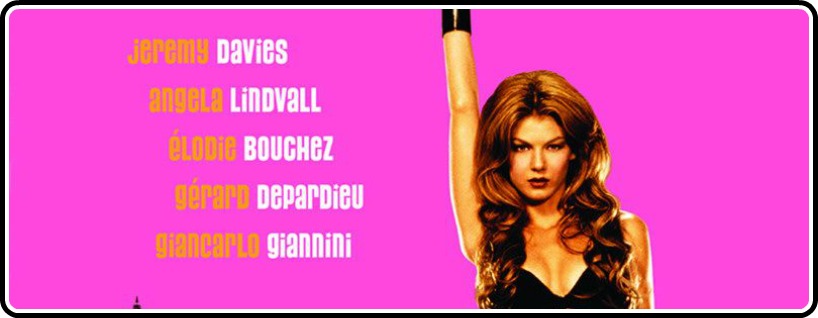
When one utters the name Coppola, a myriad of things pop to mind. Be it the patriarch of the filmmaking clan, Francis Ford and his collection of masterful pieces of craft ranging from the maddeningly brilliant Apocalypse Now to the unsung masterpiece Rumble Fish, or one of the voices of this generation, his daughter Sofia, the name brings with it not only instant credibility but a set of creative and artistic expectations. And now with the latest Coppola to hop behind the camera in the form of Palo Alto director Gia Coppola, it’s about time people stand up and pay attention to a truly underrated piece of work from this filmmaking blood line.
Helmed by Francis Ford Coppola’s son and oft-Wes Anderson collaborator Roman Coppola, CQ debuted in theaters in 2001, and has since become something of a forgotten cult classic. Itself a riff on the cult classic genre pictures that took the world by storm in the ‘60s, Coppola’s film tells the story of a filmmaking team working on a sci-fi, female led espionage sci-fi picture, and the trials and tribulations of one artist searching for his voice in the world. Nearing the end of production, the film sees its director, an artiste name Andrzej (Gerard Depardieu in a gloriously dry and offbeat performance) fired due to his lack of interest in crafting an ending that concludes the film “with a bang.” Led by the firesome producer Enzo (Giancarlo Giannini), the film briefly lands in the hands of a schlockmaster horror wunderkind named Felix DeMarco (Jason Schwartzman), only to land in the unsuspecting lap of the film’s editor and second unit director Paul (Jeremy Davies). Our lead, Paul is an American in the throes of a romance with a beautiful French woman who doesn’t quite understand his interest in shooting his daily life, which he believes to be his way of hunting down “something real.”
However, his life takes a decidedly fantastical turn, when he starts having deep feelings for the film’s lead starlet, a beautiful blonde played by the ever enthralling Angela Lindvall. A beautifully crafted love letter to ‘60s era genre pictures and even more so one’s inherent drive to express him or herself, Roman Coppola, with this picture, proves that he’s yet another singular voice within the Coppola household, cutting out a niche all his own.
The first thing one takes away from this film is that, while it is very much rooted within the world of 60’s genre cinema, the aesthetic feels decidedly modern. Be it the exciting exploration of Paul’s creative process during a montage showing a few of the touches he threw into the film via his second unit direction (there’s one involving a shot that appears to be of galaxies that when it’s revealed how he did it it becomes really quite exciting and beautiful) or the use of an exterior camera for sequences involving driving, Coppola isn’t afraid to let his hair down and his experimental side go wild. The 16mm film our lead is working on feels intimate and while it may seem pretentious when introduced, there’s a playfulness to it and a truth to its intent that it adds a lot of heart to the film. The photography is breathtaking here, with some fantastic costumes from designer Judy Shrewsbury, which cinematographer Robert Yeoman has no issue in making look as stunning as anything you’ll seen now 13 years later. The film within this film allows Roman Coppola to try his hand at some sci-fi work and even a bit of action, all of which feels breathlessly tactile and vital, particularly an action set piece set outside a space station on the moon. It’s a fantastic sequence and while it hints at the influence the aforementioned Wes Anderson may have had on his aesthetic, it feels entirely singular to Roman Coppola. Rounded out by a score from Mellow, the film is a really great bit of craftsmanship from an underrated filmmaker.
It also helps that the performances here are universally fantastic. Davies leads the way and while his soft spoken aspiring filmmaker feels a bit broad, there are a handful of touching sequences here (particularly one of him telling his camera he wants to break up with his girlfriend only to have her walk in) that really adds some much needed depth to an otherwise broad character. Depardieu’s fired filmmaker is a joy to watch, particularly during the sequence in which he’s let go, as it is one of Depardieu’s most entertaining bits of physical comedy to date. Giannini is also fantastic here as the lively producer who isn’t quite sure how many films he’s helped make, and the energy he brings to the film is a perfect opposite to Davies’ quiet and thoughtful Paul. Toss in some fun supporting turns from Schwartzman, Lindvall and even Billy Zane, and you have a cast that is as committed to this odd picture as one could ever be to any piece of art.
Now, one must be wondering, “this is from the Coppola family, and with a big cast, a home video release has to be readily available?” Sadly, that’s not the case. A DVD is available, but it’s a bit tougher to find. The transfer looks fine, but a Blu-ray with a new restoration is desperately needed. The DVD includes a commentary with Coppola and Yeoman that is ripe and ready for a direct port, and with some featurettes including a live performance from Mellow, there’s not a ton that really needs to be added. That said, most features are relatively standard EPK sequences, so fresh interviews with the cast and crew would be welcome, and a look into the film’s influences ranging from sci-fi cinema to the hints at some Godard worship would be welcome as well. The film is more than worthy of an expansive release, and hopefully Criterion could one day be the company to bring us just that.


